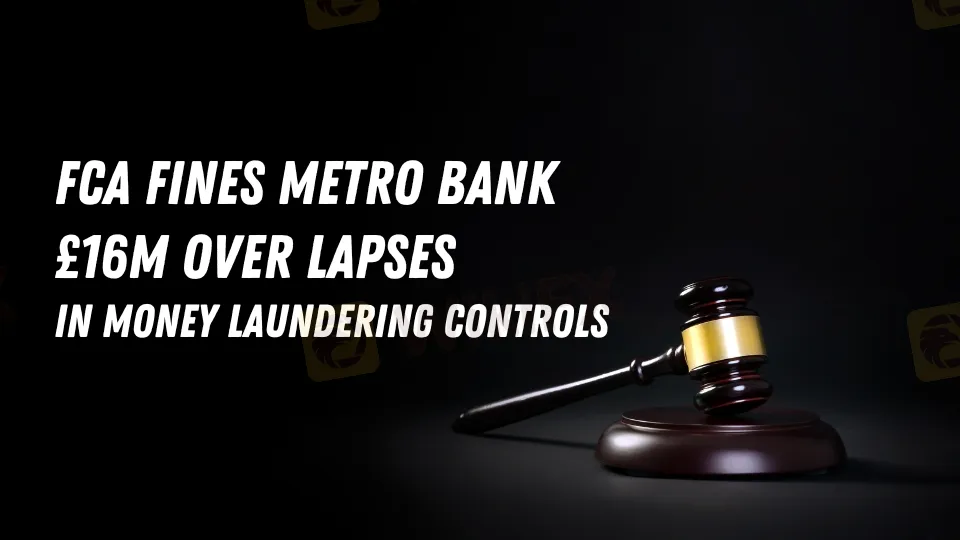简体中文
繁體中文
English
Pусский
日本語
ภาษาไทย
Tiếng Việt
Bahasa Indonesia
Español
हिन्दी
Filippiiniläinen
Français
Deutsch
Português
Türkçe
한국어
العربية
FCA Fines Metro Bank £16M Over Lapses in Money Laundering Controls
Abstract:Metro Bank faces a £16M FCA fine for failing to monitor transactions for money laundering risks, marking ongoing regulatory challenges for the bank.

Metro Bank has been fined more than £16 million by the UK's Financial Conduct Authority (FCA) for severe flaws in its transaction monitoring systems designed to combat money laundering. The FCA's inquiry discovered that Metro Bank failed to develop suitable procedures to adequately monitor nearly 60 million transactions totaling more than £51 billion going back to 2016.
Metro Bank's issues started in June 2016, when it adopted an automated monitoring system. The system was defective from the start despite its intended purpose of detecting evidence of financial wrongdoing. Due to data processing problems, transactions done on the same day an account was opened—or until the account record was updated—were ignored by the monitoring system. Junior employees at Metro Bank allegedly expressed concerns in 2017 and 2018 about holes in transaction monitoring. However, these issues were not adequately addressed, and the monitoring gap remained until July 2019, when the bank established a temporary solution. A comprehensive solution was not implemented until December 2020, more than four years after the monitoring system's first launch.

Therese Chambers, joint executive director of enforcement and market monitoring at the FCA, voiced worry about the duration of these failures. “Metro's failures threatened to leave a vacuum in our protection against illicit exploitation of our financial system. ”Those failings persisted for far too long, Chambers said.
This is hardly Metro Bank's first encounter with authorities. The FCA levied a £10 million penalty in 2022 for breaches of Listing Rules, including providing investors with misleading information regarding its prudential status. Former executives, including CEO Craig Donaldson and CFO David Arden, received individual fines of £223,100 and £134,600 for their roles in the incident.
In light of these recurring concerns, Metro Bank has had significant hurdles in preserving its regulatory status. Mistakes in transaction monitoring and financial reports have raised persistent questions about the bank's operational control and regulatory compliance.
Final Thoughts
The FCA's sanctions against Metro Bank highlight the need for strong compliance frameworks, especially in a financial climate that requires strict anti-money laundering measures. Addressing systemic problems and adopting rigorous controls will be important for Metro Bank in regaining the trust of regulators and stakeholders.

Disclaimer:
The views in this article only represent the author's personal views, and do not constitute investment advice on this platform. This platform does not guarantee the accuracy, completeness and timeliness of the information in the article, and will not be liable for any loss caused by the use of or reliance on the information in the article.
Read more

The Hidden Checklist: Five Unconventional Steps to Vet Your Broker
Forex broker scams continue to evolve, employing new tactics to appear credible and mislead unsuspecting traders. Identifying these fraudulent schemes requires vigilance and strategies beyond the usual advice. Here are five effective methods to help traders assess the legitimacy of a forex broker and avoid potential pitfalls.

Doo Financial Obtains Licenses in BVI and Cayman Islands
Doo Financial, a subsidiary of Singapore-based Doo Group, has expanded its regulatory footprint by securing new offshore licenses from the British Virgin Islands Financial Services Commission (BVI FSC) and the Cayman Islands Monetary Authority (CIMA).

CFI’s New Initiative Aims to Promote Transparency in Trading
A new programme has been launched by CFI to address the growing need for transparency and awareness in online trading. Named “Trading Transparency+: Empowering Awareness and Clarity in Trading,” the initiative seeks to combat misinformation and equip individuals with resources to evaluate whether trading aligns with their financial goals and circumstances.

Malaysian-Thai Fraud Syndicate Dismantled, Millions in Losses Reported
The Royal Malaysia Police (PDRM) has received 26 reports concerning the Nicshare and CommonApps investment schemes, both linked to a major fraudulent syndicate led by a Malaysian citizen. The syndicate’s activities came to light following the arrest of its leader by Thai authorities on 16 December.
WikiFX Broker
Latest News
ASIC Sues Binance Australia Derivatives for Misclassifying Retail Clients
WikiFX Review: Is FxPro Reliable?
Malaysian-Thai Fraud Syndicate Dismantled, Millions in Losses Reported
Trading frauds topped the list of scams in India- Report Reveals
AIMS Broker Review
The Hidden Checklist: Five Unconventional Steps to Vet Your Broker
Russia to Fully Ban Crypto Mining in 10 Regions Starting January 1, 2025
YAMARKETS' Jingle Bells Christmas Offer!
Why is there so much exposure against PrimeX Capital?
Doo Financial Expands Regulatory Reach with Offshore Licenses in BVI and Cayman Islands
Currency Calculator


